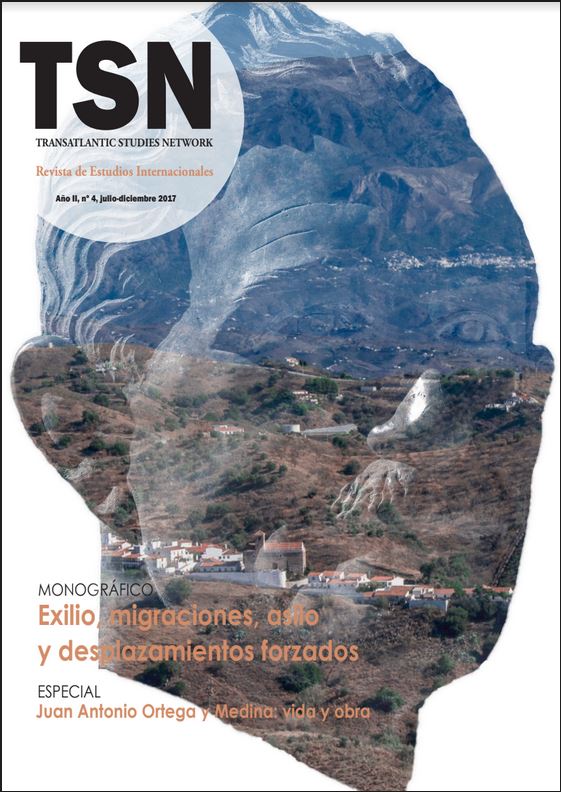Dichotomy Public-Private. Refugee Women: Subject or Not Subject of International Refugee Law?
DOI:
https://doi.org/10.24310/transatlantic-studies-network..4.2017.19363Keywords:
International protection, gender persecution, dichotomy public-private, androcentric biasAbstract
Even though gender is not specifically referenced in the 1951 Geneva Convention relating to the status of refugees, during the last decade many efforts had been made in order to take into account gender in the status determination processes, and many women have been granted refugee status on account of their gender. Notwithstanding women still face more difficulties than men to be recognized as refugees due to the androcentric bias in the law interpretation. A more inclusive interpretation of the law is needed so as to widen the subject of the International Refugee Law and affirm the universality of this area of the law. To that end, defy the dichotomy public-private is of paramount importance
Downloads
Metrics
References
Agger, Inger (1992): The Blue Room: Trauma and Testimony among Refugee Women. Londres: Zed Books.
Amorós, Celia (2000): Feminismos y filosofía. Madrid: Síntesis, S. A.
Barrère Unzueta, María Ángeles (2013): «Versiones de la democracia, feminismos y política radical», en Ruth Mestre y Yanira Zúñiga (coords.): Democracia y participación política de las mujeres. Visiones desde Europa y América Latina. Valencia: Tirant lo Blanch, pp. 45-80.
Beltrán, Elena (1994): «Público y privado. Sobre feminis- tas y liberales: argumentos en un debate acerca de los límites de lo político», en Doxa, 15-16, pp. 389- 405.
Benhabib, Seyla (1993): «Models of Public Space: Hannah Arendt, the Liberal Tradition, and Jürgen Habermas», en C. Calhoum (ed.): Habermas and the Public Sphere. Cambridge: MIT, pp. 90-92.
Bobbio, Norberto (1989): Estado, gobierno y sociedad. México: FCE.
Castel, Jacqueline (1992): «Rape, Sexual Assault and the Meaning of Persecution», en International Journal of Refugee Law, 4 (1), pp. 39-56.
Charlesworth, Hilary (1995): «Human Rights as Men’s Rights», en Julie Peters y Andrea Wolper (eds.): Women’s Rights, Human Rights, International Feminist Perspective. Nueva York: Routledge, pp. 103-114.
— (1994): «What are “Women’s International Human Rights”?», en Rebecca Cook (ed.): Human Rights of Women, National and International Perspectives. Filadelfia: University of Pennsylvania Press, pp. 58-84.
Cook, Rebecca (1994): «State Responsibility for Violations of Women’s Human Rights», en Harvard Human Rights Journal, 7, pp. 125-175.
Crawley, Heaven (2001): Refugees and Gender, Law and Process. Bristol: Jordan.
— (2000): «Gender, Persecution and the Concept of Politics in the Asylum Determination Process», en Forced Migration Review, 9, pp. 17-20.
Freedman, Jean (2015): Gendering the International Asylum and Refugee Debate. Londres: Palgrave Macmillan.
Fries, Lorena; y Matus, Lorena (1999): El derecho. Trama y conjura patriarcal. Santiago de Chile: LOM Ediciones/ La Morada.
Habermas, Jürgen (1987): Teoría de la acción comunicativa. Madrid: Taurus.
Honkala, N. (2017): «“She, of Course, Holds No Political Opinions”: Gendered Political Opinion Ground in Women’s Forced Marriage Asylum Claims», en Social and Legal Studies, 26 (2), pp. 166-187.
Indra, Doreen Marie (1989): «Ethnic Human Rights and Gender Differences: Gender Implications for Refugees Studies and Practice», en Journal of Refugees Studies, 2 (2), pp. 221-242.
Kim, Nancy (1993): «Toward a Feminist Theory of Human Rights: Straddling the Fence between Western Imperialism and Uncritical Absolutism», en Columbia Human Rights Law Review, 25, pp. 49-105.
Mestre i Mestre, Ruth (2006): La caixa de Pandora. Introducció a la teoria feminista del dret. Valencia: Universitat de València.
Mitchell, Juliet (1971): Women’s State. Nueva York: Random House.
Moller Okin, Susan (1998): «Gender, the Public and the Private», en Anne Phillips (ed.): Feminism and Politics. Oxford, Nueva York: Oxford University Press, pp. 116- 141.
Murillo, Soledad (1996): El mito de la vida privada. Madrid: Siglo XXI.
Musalo, Karen (2005): «La Convención de 1951 sobre el Estatuto de la Persona Refugiada y la protección de las mujeres frente a las violaciones de sus derechos fundamentales», en Revista de Derecho Migratorio y Extranjería, 8, pp. 9-22.
Olsen, Francis (2000): «El sexo del Derecho», en Alicia E. C. Ruiz (comp.): Identidad femenina y discurso jurídico. Buenos Aires: Biblos, pp. 25-45.
Pateman, Carole (1989): «Críticas feministas a la dicotomía público-privado», en Anne Phillips (ed.): Feminism and Politics. Oxford, Nueva York: Oxford University Press, pp. 31-52.
Pettman, Jan Jindy (1996): Worlding Women: A Feminist International Politics. Londres: Routledge.
Pitch, Tamar (2003): Un derecho para dos. La construcción jurídica de género, sexo y sexualidad. Madrid: Editorial Trotta.
Romany, Celina (1994): «State Responsibility Goes Priva- te: A Feminist Critique of the Public/Private Distinction in International Human Rights Law», en Rebecca Cook (ed.): Human Rights of Women, National and International Perspectives. Filadelfia: University of Pennsylvania Press, pp. 85-115.
Spijkerboer, Thomas (1994): Women and Refugee Status: Beyond the Public/Private Distinction. La Haya: Emancipation Council.
Valji, N.; De la Hunt, L. A.; Moffett, H. (2003): «Where Are the Women? Gender Discrimination in Refugee Policies and Practices», en Agenda, 55, pp. 61-72.
Villanueva Flores, R. (2006): «Protección constitucional de los derechos sexuales y reproductivos», en Instituto Interamericano de Derechos Humanos, 43, pp. 391-450.
Young, Iris Marion (1990): Justice and the Politics of Difference. Princeton: Princeton University Press.
Downloads
Published
How to Cite
Issue
Section
License
Copyright (c) 2024 TSN. Transatlantic Studies Network

This work is licensed under a Creative Commons Attribution-NonCommercial-ShareAlike 4.0 International License.



























